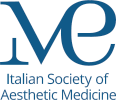ARTICLE
COVID-19 disease has deeply marked everyone’s daily life over the past three years. An interesting aspect that has emerged in the aftermath of the global pandemic, is the rising interest and positive attitude of people towards cosmetic procedures 1. Data from the ASPS (American Society of Plastic Surgeons) and ISAPS (International Society of Aesthetic Plastic Surgery) have confirmed the trend towards an increase in cosmetic procedures, following the ASPS has reported the result of a national survey, unveiling a higher willingness among women to undergo cosmetic procedures, both surgical and non-surgical, compared to the pre-pandemic period 2. Despite the initial setback owed to the interruption of most elective surgeries, many people have seen the social-distancing era as an opportunity to undergo aesthetic procedures. Homeworking has meant the chance to fully recover from surgery at home, with no need to go out in public with visible scars and bruises. Beyond this, the daily use of social media, and high engagement in video-conference meetings, has led people to constantly face with their appearance. Increased time spent on video platforms, use of social media and filters, have been related with worsening of self-perception, and anxiety in resuming in-person activities. Major reported concerns of appearance during pandemic included weight gain, skin discolouration, and wrinkles 3. Unsurprisingly, the most common surgical procedures in the aesthetic field performed during 2020-2021 period were nose surgery, eyelid surgery and facelift, whereas among minimally invasive procedures the most sought were botulinum toxin injections, soft tissue fillers and laser skin resurfacing 2. The years of pandemic have also led many people to reduce physical activity and get incorrect eating habits, resulting in undesirable weight gain. A high demand for body contour surgeries has been witnessed as part of the current post-pandemic boom in the aesthetic field. As we are hopefully moving beyond the social distancing era, being aware of the impact that virtual platforms, communication via social media, and restrictions have had over these years on self-perception and esteem, is key to better guide and serve our patients. The unrestrained advertising on aesthetic procedures via social media, influencers, and beauty advisors, often fosters a superficial attitude towards the field and limits public awareness. Although feeling comfortable with own’s appearance is of utmost importance in personal well-being, any aesthetic procedure has its risks and complications, which should be carefully discussed with trusted and trained physicians.






